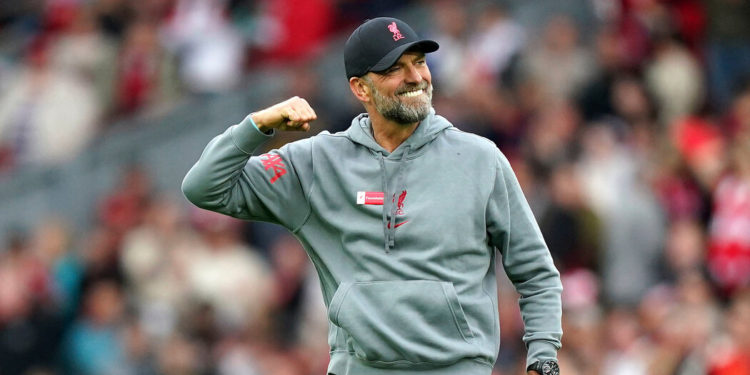By THE NEW YORK TIMES
For Jürgen Klopp, the montages will be long and they will be emotional. There will, naturally, be artful drone shots of Liverpool’s skyline. There will be slow-motion footage of red-and-white scarves, twirling and writhing. There will, absolutely, be a stirring, possibly classical score.
But most of all, in the wake of Klopp’s announcement on Friday that he will step down as Liverpool manager, there will be images of all the memories he made: the bus parades and the trophy lifts, the fist pumps and the bear hugs, the rich and wide iconography of glory.
The chances are that when they come — and they will come, in great number, as Klopp’s last game at the club rolls around toward the end of May — they will not linger too long on the immediate aftermath of a 2-2 draw with West Bromwich Albion in 2015, a game that lifted Liverpool to the dizzying heights of ninth place in the Premier League.
And yet, more than eight years later, that night has the feel both of a signpost of what was to come and an encapsulation of how it would be achieved. Klopp had been in charge of Liverpool for only a couple of months back then. In the piercing clarity of hindsight, though, that match looks an awful lot like the moment Liverpool became his club.
To recap: A patchwork Liverpool team had required a late goal from Divock Origi — another leitmotif, there — to rescue a point at home to a West Brom squad battling relegation. At the end of the game, Klopp insisted his players link hands and walk over to the Kop, the soaring grandstand that is home to Liverpool’s most ardent fans, and thank them for their efforts.
In Germany, this is standard practice. Klopp had grown up knowing that teams do it, or are supposed to do it, after pretty much every game, regardless of the result. In the dim and distant past of England in 2015, though, it was unfamiliar. It was not the sort of thing English teams did. Or worse: It was a foreign affectation.
And so the fans did what they always do when faced with an unsolicited import: They immediately misunderstood it, mocking Klopp for encouraging his players to “celebrate” a draw at home with West Brom.
The perception of the Liverpool that Klopp has built in the years since makes it difficult to imagine that the Liverpool he found, upon agreeing to become its manager in October 2015, can ever have existed. It was not just that the team he inherited was not especially successful — the Luis Suárez-inspired title challenge of 2014 a lone beacon in a lustrum of mediocrity — it was that it lacked any real idea of how it might ever be successful again.
The club’s owners, Fenway Sports Group, had made several smart appointments in an attempt to turn it into a bastion of modernity — Michael Edwards, the sporting director, and Ian Graham, who would become director of research — but there had been resistance to their input from Brendan Rodgers, the coach. For years, the club seemed to have been lacking consensus, direction and, to some extent, purpose.
That had leached out into the stands. All fan bases contain multitudes of opinion, of course, but Liverpool’s had seemed irreconcilably split for years. Some liked the data-driven American owners. Some hated them. Some thought it their duty to protest. Some thought that bordered on treason. Some supported Rodgers. Some pined for the return of trophy-winning predecessors like Kenny Dalglish, or Rafael Benítez. Each camp thought the other not just misguided but somehow malicious.
A manager’s legacy is, of course, something that soccer believes can be relatively easily gauged. For clubs like Liverpool, it is measured in silver and gold: It is a thing that can be weighed. And by those standards, Klopp will be assessed more than kindly.
He led Liverpool to a Premier League title, a Champions League, a Club World Cup, a European Super Cup, an F.A. Cup and a League Cup. (He may yet win more trophies, of course: Liverpool remains alive in four competitions this season, and has reached the final of one of them already.) He is, without question, the club’s finest manager of the modern era, one who certainly warrants inclusion in the pantheon of Premier League greats.
There are other milestones, too, that burnish his credentials. He has recorded several of the highest points tallies in Premier League history. At one point, he had taken 106 out of an available 108 points in the self-proclaimed best league in the world. Between 2018 and 2022, he led Liverpool to three Champions League finals in five years.
In the tribal vapidity of soccer fandom, of course, that is taken as a sign that he should have won more. Even Klopp might, at times, wonder whether life might have been a little more enjoyable had Pep Guardiola and Manchester City not been around. A kinder reading would suggest that not only was the consistency of Klopp’s Liverpool astonishing, but that occasionally falling short served to humanize him and his team.
The very best managers, though, should not solely be assessed on how much they win, but on what they leave behind. It was on Klopp’s watch that Liverpool was transformed from a faded giant, a nostalgia brand, into probably — at least alongside Manchester City — the most progressive, the most cutting-edge of the game’s modern superpowers.
Klopp, proudly, is a natural delegator. He did not understand how the club’s data department reached its conclusions. He did not pretend that he knew how their algorithms or data pipelines worked. But he knew that he trusted their judgment, and that he wanted to work with them rather than against them.
And so, instead of resisting, he empowered Edwards and Graham to lead the club’s recruitment efforts. One story goes that when Klopp wanted to sign the German playmaker Julian Brandt in the summer of 2017, Edwards, not exactly a shrinking violet, had to be characteristically intractable to persuade him that Mohamed Salah was the better bet.
The same approach played out in almost every facet of the club’s existence. He handed over control of the players’ diet to Mona Nemmer, the nutritionist he had brought in from Bayern Munich. They used to joke that one day the club should publish a recipe book. Nemmer assumed they were joking, anyway. The book came out in 2021.
And, most of all, Klopp made a point of outsourcing to the fans the job of making Anfield imposing once more, the sort of place where West Bromwich Albion did not come in thinking it might steal a point, or three. At times, that required being a little belligerent, exhorting the fans to be more vocal, even encouraging those who did not want to join in to hand their tickets to someone else.
It was, though, worth it. For eight years, what has marked Liverpool out has been the sense of unity, something he — quite deliberately — engineered. That awkward moment of communion against West Brom was the first step in rebuilding the bond between field and stands, between players and fans.
That, ultimately, is what the very best managers do. No individual is ever bigger than a team. Players and coaches are fleeting, temporary. The institution of the club is eternal. But just occasionally a figure comes along who, through sheer force of personality, can bend and shape and twist a club’s identity, whose charisma is so great that it can change the code of a place.
Liverpool is — not uniquely, but perhaps more than most — prone to that. To some extent, it yearns for it. It is a club that believes ardently in the Great Man Theory of history, a place that is desperate for a leader to follow, an idol to worship, a creed to believe. Klopp fit the bill perfectly.
The Liverpool that he will leave behind in May is identifiably his, different from the Liverpool that he found, to the Liverpool that came before. Its style of play, rooted in the high-pressing philosophy that Klopp brought from Germany, is his, but so is its belief in data, its urge to experiment, its conviction that success is collective, not individual. All of that owes something to Klopp. All of that is what he leaves behind, and the best measure of his legacy: that the place he leaves is not the same as the place he found.







Discussion about this post